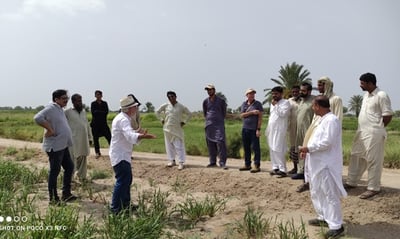Salinity in Agriculture: Challenges for Farmers
Salinity in agriculture is a critical challenge for rural communities, especially in arid regions like Pakistan's Indus Basin. It severely impacts soil health, farm productivity, and the livelihoods of far...
RURAL INNOVATION
Muhammad Bilal Ahsan
9/14/2024


Salinity is one of the most pressing challenges facing agricultural communities worldwide, particularly in regions with arid and semi-arid climates. In areas such as Pakistan's Indus Basin, salinity has a profound impact on soil health, farm productivity, and the livelihoods of local farmers. As saline water and soils become increasingly problematic, agricultural communities are forced to confront dwindling yields, lower-quality crops, and deteriorating economic prospects.


This challenge is not unique to Pakistan, but the country’s reliance on agriculture for both domestic food security and economic stability makes it particularly vulnerable. In response, a transformative initiative funded by the Australian government, through the Australian Centre for International Agricultural Research (ACIAR), is introducing adaptive farming practices to help communities cope with and overcome the threats posed by salinity. The project, titled "Adapting to Salinity in the Southern Indus Basin," has received funding of 2.9 million Australian dollars and is poised to bring about significant positive changes in agricultural practices and livelihoods in Pakistan.
Salinity in Pakistan's Indus Basin: A Growing Threat
Pakistan’s agricultural sector accounts for nearly 24% of the country’s GDP and employs a significant portion of the workforce. However, the sector has long faced the challenge of salinity, which reduces the fertility of agricultural land and limits crop productivity. This issue is particularly pronounced in Pakistan's Indus Basin, where improper irrigation practices, soil erosion, and water mismanagement have worsened the salinity problem over time.
Project farmers at selected sites (bright spots) in regions such as South Punjab, Inner Sindh, and coastal areas near Keti Bandar along the Arabian Sea have faced dwindling crop yields and increasing difficulty in sustaining profitable farming practices. These challenges are exacerbated by outdated farming techniques, limited irrigation water, and insufficient access to quality seeds, market access, and stable prices. For many farmers in these communities, salinity is more than just an agricultural issue—it threatens their livelihoods and food security.
ACIAR’s Salinity Adaptation Project: A New Approach
The ACIAR-funded project "Adapting to Salinity in the Southern Indus Basin" aims to address the core issues surrounding salinity by introducing innovative and adaptive farming practices. The project focuses on empowering farmers through community-led initiatives and farmer-to-farmer learning. By involving local farmers as key players in the development and implementation of new agricultural strategies, the project fosters a sense of ownership and commitment, ensuring that the changes are sustainable and long-lasting.
One of the most significant aspects of this project is its focus on collaboration between local farmers and international experts. By leveraging Australian expertise in salinity management, particularly drawing lessons from the Murray-Darling Basin, the project provides Pakistani farmers with cutting-edge techniques that are proven to work in saline environments. This cross-border exchange of knowledge has been essential in identifying and adapting strategies to the specific challenges of the Indus Basin.
Farmer-Led Experiments: Innovative Approaches to Saline Agriculture
A key component of the project is the implementation of farmer-led experiments, which allow local communities to explore new techniques for managing salinity and improving agricultural productivity. These experiments include integrated farming methods, the introduction of salt-resistant crop varieties, and the cultivation of alternative crops such as ispaghol, moringa, guava and vegetables. Additionally, the project encourages composting, intercropping of fruits and crops, and exploring value-added opportunities to enhance both productivity and sustainability.
One of the most successful experiments within the project has been the use of organic mulch to improve soil quality and reduce water usage. By comparing different mulch materials, farmers found that organic mulch significantly improved the quality of fruits and vegetables, minimized the growth of weeds, and reduced the overall water consumption. This practice not only boosts productivity but also contributes to environmental sustainability by reducing the need to burn crop residues such as rice straw, a common practice that contributes to air pollution.
Through these experiments, farmers have gained valuable insights into sustainable farming techniques that can withstand the harsh conditions caused by salinity. The adoption of these practices has improved crop yields and product quality, ultimately increasing the profitability of farming in saline-affected areas.
Value Chain Development: Enhancing Market Access and Profitability
While improving on-farm practices is critical, the project also emphasizes the importance of developing value chains that connect farmers with markets. Historically, farmers in saline regions of Pakistan have had limited access to markets, selling their products at nearby local markets where competition is high, and prices are volatile. This lack of market access has often led to low prices for crops such as moringa, spinach, okra, and other vegetables, reducing the profitability of farming.
To address this issue, the project has introduced strategies to develop value chains that connect farmers with downstream retailers and consumers. Farmers were actively involved in learning how to build and maintain relationships with retailers and enhance their market presence. By focusing on creating direct links with consumers and exploring new market channels such as e-commerce, farmers were able to stabilize prices, reduce wastage, and improve profitability.
One example of success in value chain development comes from the community’s efforts to process and market moringa leaf powder. Previously, farmers sold raw moringa flower buds as vegetableto pre harvest contractor while wasting leaves, where they fetched low prices. Through the project, farmers learned how to process the leaves into powder, a product with significantly higher market value due to its health benefits and longer shelf life. By marketing moringa leaf powder directly to consumers, farmers were able to nearly double their benefit-cost ratios, significantly improving their livelihoods. Similarly, community farmers established strong, long-term relationships with local retailers for selling their vegetables, which led to greater profits compared to traditional market channels.
The project also introduced farmers to advanced processing techniques that further enhanced the quality and consumer value of their produce. Such as shade drying, farmers also learned how to grade fruits and vegetables more effectively, ensuring that only the highest quality products reached the market. This focus on quality control increased consumer trust and demand for products such as pomegranate, spinach, onion, and cauliflower.
Turning Challenges into Opportunities
The project’s success lies in its ability to turn the challenges posed by salinity into opportunities for growth and innovation. By equipping farmers with the knowledge and tools they need to adapt to changing environmental conditions, the project has helped them not only survive but thrive in a difficult agricultural landscape.
Through its focus on community-led initiatives and farmer-to-farmer learning, the project has fostered a strong sense of collaboration and shared responsibility. Farmers have become active participants in the development and implementation of new practices, taking ownership of their future and the future of their communities.
The outcomes of the project are clear: improved crop yields, higher-quality produce, expanded market access, and increased profitability for farmers in Pakistan’s saline-affected regions. This success has had a ripple effect throughout the farming community, inspiring others to adopt similar practices and further strengthening the agricultural sector.
A Case Study in International Collaboration
The "Adapting to Salinity in the Southern Indus Basin" project serves as a case study in the power of international collaboration and community-driven innovation. By combining Australian expertise with local knowledge and leadership, the project has demonstrated how targeted, strategic interventions can lead to meaningful and lasting change.
Moreover, the project’s success highlights the importance of addressing environmental challenges such as salinity in a holistic manner. By focusing on both on-farm practices and market development, the project has ensured that farmers not only improve their agricultural productivity but also achieve long-term economic sustainability.
Conclusion: A Model for the Future
The success of this project offers valuable lessons for other regions facing similar challenges. Adaptive farming practices, when combined with strong community leadership and international support, can transform the agricultural sector in even the most challenging environments.
In the case of Pakistan’s Indus Basin, the project has not only improved agricultural practices but also enhanced the livelihoods of thousands of farmers. By turning salinity into an opportunity for innovation, this initiative has paved the way for a more sustainable and prosperous future for Pakistan’s agricultural communities.
As the global climate continues to change, the lessons learned from this project will become increasingly important. By adopting adaptive farming practices and building resilient agricultural systems, farmers around the world can confront environmental challenges head-on and secure a brighter future for themselves and their communities.
Please note that the views expressed in this article are of the author and do not necessarily reflect the views or policies of any organization.
Muhammad Bilal Ahsan is a faculty member at MNS University of Agriculture Multan, Pakistan
Related Stories
Reframe your inbox
Subscribe to our newsletter and never miss a story.
We care about your data in our privacy policy.
"The Agricultural Economist," your essential weekly guide to the latest trends, research, and insights in the world of agriculture and economics.
The Agricultural Economist © 2024
Published by The AgEcon Frontiers (TAEF)
All rights of 'The Agricultural Economist' are reserved with TAEF
